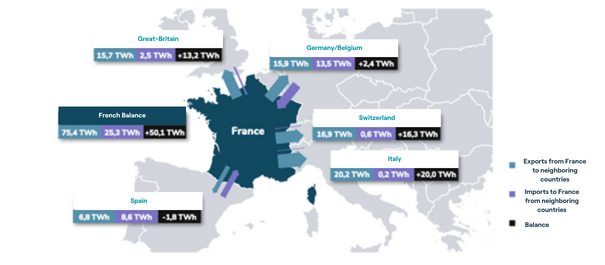The European electricity market is much criticized in France, even though we benefit from it thanks to the Iberian exception and its low-carbon exports.
"Aberrant" and "obsolete" is Bruno Le Maire's verdict on the European electricity market. According to the Minister of the Economy, this market "doesn't work", as it prevents France from enjoying "independence in terms of electricity production". He is not the only one in France criticizing the trading of megawatt-hours (MWh) with neighboring countries. Trade unions such as the CGT and Sud Energie have made market exit one of their key battles. Yet, France benefits from being able to buy and sell electricity to its neighbors at market prices.
The nuclear crisis and the Iberian exception
As we pointed out in a previous post, 2022 was an unusual year for the French electricity market. With nuclear reactors shut down and rainfall deficits limiting hydroelectric production, France had to source power from outside its borders to avoid blackout. In total, 16 terawatt-hours (TWh) were imported in 2022, according to the French Energy Regulatory Commission (CRE). This is surprising for a country that has historically been a net exporter of electricity (43 TWh exported in 2020 and 2021), and whose consumption fell by 4% in 2022. The main cause was the low availability of nuclear power (around 52% of installed capacity). The minimum was reached in August 2022, with 22 gigawatts (GW) available out of a fleet of 61 GW. Cross-border high-voltage lines were fully utilized to bridge this gap.
Another peculiarity of 2022 was the exception of the Iberian Peninsula. Under pressure from companies and households whose bills were skyrocketing, the European Commission authorized the Spanish government to change the rules of the market by subsidizing gas-fired power plants.
The argument put forward to justify this exceptional state aid was the isolation of the Iberian electricity grid due to its poor interconnection with the rest of Europe. The result was as expected: a spectacular drop in the price of electricity on the wholesale market, which also benefited... French retailers and consumers!
The price per megawatt-hour was systematically lower in Spain than in France: for 2022, the average was 167 euros in Spain versus 275 euros in France. The gap was particularly wide in summer. For example, on August 1st 2022, prices were around 500 euros in France versus 150 euros in Spain, according to eco2mix. Thanks to 1,400 MW of interconnection capacity, France earned substantial income that day by taking advantage of the price differential (of the order of 1,400 x (500-150) = 490,000 euros per hour, gross of network access rights). The rules of the European electricity market thus reduced the bill for nuclear failure in France.
Making the most of price differentials
In 2023, gas and electricity prices gradually fell back. France's nuclear fleet was back in full operation. France once again became a net exporter of electricity to Europe, with a positive trade balance of 50 TWh. Nevertheless, as the map below from RTE's 2023 shows, the balance was not positive on all interconnections.

Unsurprisingly, at the Spanish border, France remained a net importer with trade deficit of 1.8 TWh, as the Iberian exception kept prices lower south of the Pyrenees. This was not the case when crossing the Alps (a trade surplus of 20 TWh with Italy and 16.3 with Switzerland) and the English Channel (+13.2 with Great Britain), as electrons benefited from better export market conditions. But the trade balance did not remain continuously positive. French importers were able to take advantage of negative price episodes twice as numerous in Germany as in France (301 hours vs. 147). They were remunerated for consuming electricity.
*
* *
In France, we often blame the European Union and markets when things go wrong. The European electricity market, which organizes price-based trade between countries, did not escape criticism when electricity prices soared. Yet France has benefited amply from the market, thanks to its geographical position between a low-price Iberian Peninsula and interconnected countries where prices were high (Great Britain, Italy, Switzerland). France also contributes to the decarbonization of the energy mix by exporting its nuclear production to Germany, and by importing excess of renewable energy from neighboring countries during periods of low prices. Thanks to interconnections, market forces work in favor of the climate.





